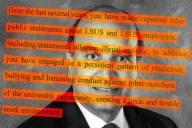You have /5 articles left.
Sign up for a free account or log in.
As Apple likes to do, it made a major media splash with its press conference today, held in the Big Apple, still seen as the heart of the publishing industry. (Besides, nudging the announcement a few hours earlier than Silicon Valley time means investors can drive up the stock price before Wall Street ends trading for the day). Several of us live blogged the event, though most of us weren’t actually there.
The word “free” came up during Apple’s presentation quite often. Apparently, Apple is offering authors a suite of powerful tools that they can use to create multimedia updateable textbooks, a CMS-like classroom platform for using them, and a distribution platform. They showed texts being put together with gorgeous illustrations and embedded video.
And all I could think (still sensitized by yesterday’s SOPA/PIPA blackout protest) was “how are we supposed to deal with permissions?” These days, in the privacy of our classrooms, we mostly . . . don’t, though legislators would like to change that by making copyright violations much more punitive and handing rights owners a prior restraint club to beat us with.
But what we do in the classroom is hard to monitor for copyright violations (or violations of an anorexic definition of fair use). That changes when you publicly use a clip of a speech or include a historic photo without going through the work of tracking down rights holders and paying the steep charges for permissions. I seek out Creative Commons-licensed materials to use, but I know that many professors (and most of their students) don’t even think about copyright when they pull together educational material to share with a class. It runs counter to the social impulse and the technological facility to share.
Apple understands how to leverage our sharing impulse into profits. Like Amazon, it realizes that offering a creative platform and gathering massive amounts of attention and brand loyalty will beat old-school media monopolies while retaining the size advantage of monopoly. Apple invites us to share the educational materials we craft four our local audiences, with easy hooks into iTunes U and CMS features Apple has developed to go with this roll-out. They want to be the platform where we freely share our courses using an easy self-publishing platform, buy textbooks developed for iPad by traditional publishers (for whom “free” is not as in beer, but as in market economy), all within an iPad-enabled course system that will be a cross between Blackboard and Amazon. It’s a social network for buying, selling, teaching, and learning. So far as I can tell, it’s geared to a world where there’s an iPad in every bookbag. That, plus 99 cent lesson plans will work out well for Apple.
Toward the end of the hour Joshua asked “Is there a corollary in education to app developers? Will we see a new class of ‘course’ developers emerge - maybe independent of existing higher ed institutions - designing courses and selling them directly from iTunesU?”
Ding, ding, ding! This is the money question. And I do mean “money.” Will education follow the Kindle example and use these open publishing platforms to buy and sell - or will they feel educational materials are more valuable if untethered from the digital marketplace?
Quite honestly, as frustrated as I have been over the years by the slow uptake of open access, I think many if not most academics are more interested in sharing than selling. They see advantages to open educational materials. They are not like the millions of writers who are self-publishing in hopes their sales will provide them with a living. The reward system for academics uses impact for currency, not dollars.
What Apple showed (quite theatrically) today sheds further light on the fork in the road we face. This is a crossroad with three options. One route is full of tollgates and copyright police, and it keeps us traveling in circles. Let’s call it the SOPA Turnpike. Another is more open, but it’s owned by the outfitter that sells us the gear we need to travel, and if an entrepreneur comes up with better gear, it still has to be sold through the outfitter’s store. That has been Apple’s approach. Awesome store! But it’s still a store.
There’s a third option, and it’s the one that is best suited to the future of networked knowledge, one where (as David Weinberger describes it in his new book, Too Big to Know) knowledge is abundant, linked, unresolved, public, and permission-free. This is a highly-traveled but as yet unpaved road and it’s one full of craters left where the owners of the SOPA Turnpike have set mines and lobbed explosives. (They really hate "permission-free.") It’s a lot more attractive to whip out your credit card and take the middle road. Let the outfitters provide minesweepers and hire the lobbyists and lawyers. But those of us who think of education and the fruits of research as liberating and essential and who care about the billions of people who can’t afford to shop at the outfitter’s store - we want to chart a better, more just, more forward-looking path.
See you on the open road.





